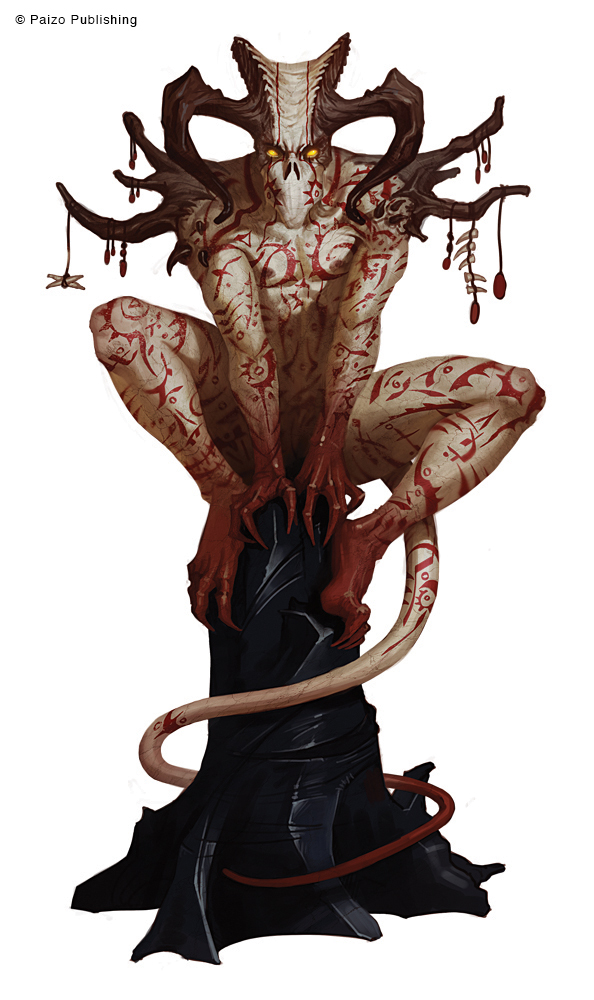Welcome to Guidance, Private Sanctuary’s source for tips and techniques for the Pathfinder Roleplaying Game, written by Everyman Gamer Alexander Augunas. Today, we’re going to be talking about the basics regarding corruptions.
Well hello, ghosts and ghouls! We’ve recently had a new hardcover release ‘round these parts, and I’m willing to bet that YOU want to know a little bit more about some of the highlights of the book! Well, you’re in luck—Ryan, Perram, Monica, and myself are doing a Horrors Adventure Review episode on the Know Direction podcast this Wednesday (August 24, 2016). Check out our calendar for the show times.
However, if you’re like me, you probably have had a heck of a time waiting this long for our episode. You have burning questions that need to be answered NOW, and judging by the forums, many of those questions revolve around the new corruption mechanic. Well, don’t worry folks—I am happy to help you out today on Guidance. Let’s dive on in to the icky terror that is the corruption mechanic.
Corruption Basics
So, what is a corruption? The easiest way to describe it is, “Mythic template gone horribly, horribly wrong.” Not in the sense that the mechanic or the benefits it provides is horrible, but in the sense that if you have a corruption you probably don’t want to hold onto it for very long. Corruptions are largely a GM mechanic that has direct implications for the corrupted player—there’s really nothing like it in Pathfinder, because the PC has very little control over how and when they get mechanical abilities from their corruption. The GM just sort of says, “Hey, here’s a power,” and you say, “Thank you, oh great and powerful GM.”
Saying how a corruption works is more like telling you the plot to a story that your GM wants to tell. First, something bad happens—the catalyst. This catalyst corrupts you utterly, causing you to gain one of the corruptions in the book. When you first become corrupted, you count as having a Stage 0 corruption and gain a manifestation of your corruption, which includes one gift (a bonus) and one stain (a penalty). From there on out, everything is in the GM’s court. Pathfinder RPG Horror Adventures has a “standard” progression for manifestations, which states you get a new manifestation at every odd character level, but it almost immediately informs you that the GM can basically do whatever they want, and the GM chooses the order that manifestations are gained (provided that the player meets the manifestation’s prerequisites).
When your corruption is getting worse and worse, you basically gain “corruptive triggers” that cause your corruption to progress to higher echelons of badness. Typically, these “triggers” involve certain things happening (or not happening) to your character—for instance, a player corrupted with vampirism has to save for each consecutive day they go without blood while a player corrupted with lycanthropy has to save during the full moon. If you fail your save, something bad happens and your Corruption Stage typically increases as a result—progressing to Corruption Level 1 or 2 usually involves a harsh penalty being inflicted upon your character, while progressing to Corruption Stage 3 usually causes you to either die or become an NPC under the GM’s control. Nothing good, basically. This makes the system into a, “power at a price,” mechanic—do you revel in the wondrous power of your corruption for long, risking your immortal soul in the process? Or do you flee and try to find help as fast as you can before your corruption eventually overtakes you? Decisions, decisions, decisions….
Corruptions as a Player Mechanic
As I said before, whether or not corruptions are a player mechanic (or whether they aren’t) is something of a hot debate. Obviously, they offer players power but they do so in a way we’ve never seen before—at a steep cost. Bad things can happen FAST to you if you try to hold on to a corruption, and I’ve seen many people argue about whether you should plan corruptions into your build, or whether options should exist that turn corruptions into less of a penalty and more of a player power up.
Personally, my thoughts are as such—corruptions are an object in the GM’s toolbox. They’re GM options that might benefit the player sometimes. Some corruptions offer no benefit to the corrupted player (such as a wizard with lycanthropy) while others might make all the difference in the world (such as a brawler with ghoul fever). In either case, the point of a corruption is to tell a story about walking down the dark path, all the while exploring the psychology of the character that is infected. Do you fight it? Do you give in and loose yourself? That is the INTERESTING part, and its what makes the corruption mechanic more than just a free power boost for the player. Personally, I don’t think that I would ever plan to be corrupted on any of my characters. It should be a natural part of the storytelling experience, and it should be up to player and PC to decide how to react to the corruption—and whether or not their choice is ultimately too late.
Revel in the dark side, ignorant if your inability to control that which infects you before it is too late. That is the fun—and the horror—of corruptions.
Alexander “Alex” Augunas has been playing roleplaying games since 2007, which isn’t nearly as long as 90% of his colleagues. Alexander is an active freelancer for the Pathfinder Roleplaying Game and is best known as the author of the Pact Magic Unbound series by Radiance House. Alex is the owner of Everyman Gaming, LLC and is often stylized as the Everyman Gamer in honor of Guidance’s original home. Alex also cohosts the Private Sanctuary Podcast, along with fellow blogger Anthony Li, and you can follow their exploits on Facebook in the 3.5 Private Sanctuary Group, or on Alex’s Twitter, @AlJAug.






I was searching for up to date information on this theme for a few days.
Now I am satisfied since I have finally reached your article.